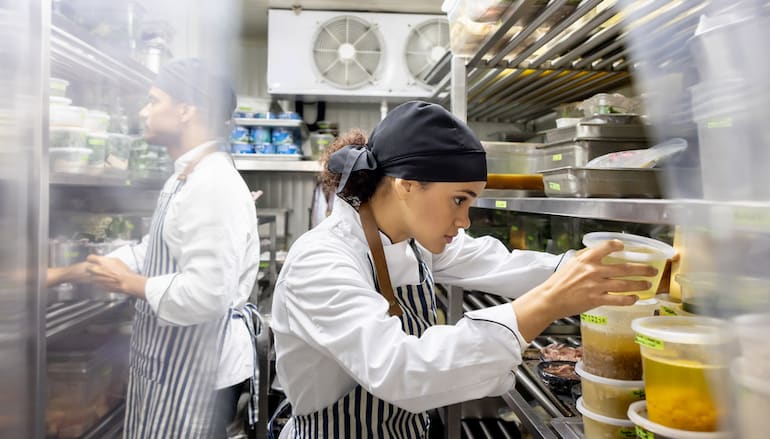Why Shared Kitchens Can Be Risky
Unlike restaurants, which have one manager setting rules, or home kitchens, where one family cooks together, commissary kitchens and commercial kitchen rentals often have many different people with different cleaning habits. Shared fridges and pantries can make things worse: unlabeled leftovers, expired food, or unsealed containers can all invite bacteria to grow. That’s why clear rules and mutual respect are so important.
1. Prevent Cross-Contamination: The Hidden Danger
Cross-contamination happens when harmful bacteria move from one food or surface to another. Raw meats, seafood, and eggs are the biggest concerns.
How to reduce the risk:
- Use separate cutting boards for raw meat and produce
- Try color-coded tools if available
- Wash surfaces and utensils with hot, soapy water after each task
- Avoid reusing sponges or towels between raw and cooked foods
- Never put cooked food back on a plate that held raw ingredients
2. Cleaning vs. Sanitizing
In food preparation spaces, wiping down isn’t enough. You also need sanitizing. Germs can stay on surfaces even after they look clean. Pay extra attention to high-touch spots like faucet handles, fridge doors, and drawer pulls.
Easy sanitizing solution: Mix one tablespoon of unscented bleach in one gallon of water. Use it on surfaces after handling raw food, or keep disinfectant wipes nearby.
3. Smarter Refrigerator Rules
Shared fridges in a licensed kitchen or commissary kitchen Vancouver can get messy fast. Poor storage increases the risk of spoilage and cross-contamination, like raw meat juices dripping onto fresh fruit.
Storage tips:
- Keep raw meats sealed and stored on the bottom shelf
- Label leftovers with names and dates
- Create a cleaning schedule to remove old or expired food
- Don’t overpack the fridge (it blocks airflow and raises temperature)
- Use clear containers so you can see what’s inside
4. Keep Learning
Food safety knowledge is your best protection. Stay updated on safe practices and common foodborne illnesses. A great resource is FoodSafe.
Final Note: Shared Space, Shared Responsibility
A shared kitchen or commissary kitchen doesn’t have to mean unsafe food practices. With clear communication, consistent hygiene, and respect for each other, these spaces can be safe, productive, and enjoyable. Foodborne illness is preventable: when everyone does their part, a shared kitchen can be just as safe as any professional or home kitchen.
If someone’s kitchen habits put others at risk, like leaving raw meat out or skipping handwashing, it’s okay to say something. Speak kindly, focus on safety, and frame it as a team effort so everyone feels included.


